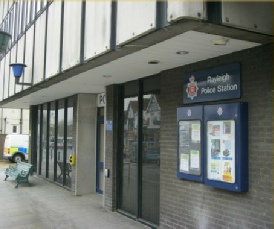








(Because of the number of links shown we no longer make direct links -
Return to Police & Messaging Contents page

19/7/16
More on Scammers
The aim of any Scammer is to part you and your money. Everyone should be on their guard as scammers are now using more sophisticated methods in their attempts to convince people that what they are offering is legitimate or official.
• Don’t be rushed – resist pressure to make a decision straight away.
• If it sounds too good to be true it probably is.
• The letter has arrived unexpectedly.
• You’ve never heard of the lottery or competition they are talking about and didn’t buy a ticket.
• They are asking you to send money in advance.
• You shouldn’t have to pay anything to get a prize.
• You’re being urged to respond quickly so you don’t get time to think about it or talk to family and friends.
• They are telling you to keep it a secret.
Stop scam mail
The Mailing Preference Service (MPS) allows you to have your name and address removed from mailing lists.
To register for the free service, call 0845 703 4599 or visit mpsonline.org.uk.
Report to Royal Mail
If you do receive correspondence you believe to be from fraudsters, you can forward it to Royal Mail with a covering letter to Freepost, Scam Mail, PO Box 797, Exeter, EX1 9UN.
You can also email scam.mail@royalmail.com or call 03456 113 413.
18/7/16
A suspicious male was seen by neighbours peering into a window in Broad Walk, Hockley, around 1720 hours on 17th July 2016. The male was challenged and ran off, jumping over garden fences to get away. The male was described as being white, aged in his 20's, slim build, around six foot tall with black hair and wearing a black top. If you saw anything suspicious please call 101 quoting incident number 0840
Residents are reminded to keep your windows, doors and external gates secure in these warmer months, particularly during periods of extreme temperature. Please ensure alarms and CCTV are activated where installed. If you require any crime prevention advice please contact one of our Crime Prevention Tactical Advisors via our .
18/7/16
Essex police are currently looking for “active citizen” volunteers to assist local neighbourhood policing officers in and around Castle Point and Rochford. There are a variety of volunteering roles available, including office based administration tasks, but we are primarily looking for citizens who will deploy with police officers in the community on crime reduction initiatives or once suitably trained to deliver crime prevention to their areas of business (housing groups).
Although there is no financial reward, this is a fantastic opportunity to help support our communities, providing an opportunity for younger volunteers to gain experience, whilst older volunteers will hopefully be able to utilise and share their life experiences, helping the police to make our community even safer.
We would like to hear from you if you are eighteen years or over (no maximum age restriction) and can commit to a minimum of six hours every month.
For further information and details, please contact the neighbourhood policing sergeant – Ps 1255 Mark Mcquade via E-
18/7/16
Today we launch a new campaign to ask the public to give us #MoreTimeToFightCrime. Up to 400 hoax or inappropriate 999 calls every month could cause serious harm or death if they prevent us from hearing about real life emergencies. We have published recordings of inappropriate, hoax and abusive 999 phone calls to highlight the problem. The calls include a man phoning 999 to complain that there is a rat in his house and someone else calling simply to swear at police.
Chief Inspector Glen Pavelin who is in charge of our Force Control Room, said: “We take a zero-
“But we also want people to understand what is and isn’t a police matter. We take hundreds of calls every month on issues like noise nuisance or parking problems which can and should be resolved by local partners like councils. We will always try and help but especially at summertime our resources can be stretched. Knowing how to do things like report non-
The campaign comes as new police figures revealed a “seasonal spike” in crime which Essex sees in summertime before the figures fall back in autumn. The force also experiences a summer increase in so-
Chief Constable Stephen Kavanagh said: “Not all crime is preventable but there are things I need people to do this summer to give us more time to fight crime during a period when we know demand for our help tends to increase. Taking sensible steps to keep your home secure, keeping track of where your children are at the beach and driving safely mean fewer incidents and more time for highly trained officers to help people in need. We’ll be giving out that information across the summer.
“I have made sure extra resources are available to keep Essex safe this summer, but I need the public to help. We get called for everything from an ‘offensive builder’s bum’ to murder and deaths on our roads: if we can raise awareness of the non-
The campaign will include social media activity to help people report non-
For more information on our campaign #MoreTimeToFightCrime please visit:
13/7/16
Help disrupt fraudsters by reporting scam emails that you receive. People receiving scam emails are urged to report them.
The reports received by Action Fraud will be forwarded to the National Fraud Intelligence Bureau run by the City of London Police for collation and analysis. This will enable crucial intelligence to be gathered and preventative action to be taken. The activity will seek to disrupt the fraudsters and close down the links between them and the victim.
Last year (January 2015 – December 2015) they received on average 8,000 reports per month, with 96,699 people reporting that they had received a phishing scam.
What should you do if you’ve received a scam email?
Do not click on any links in the scam email.
Do not reply to the email or contact the senders in any way.
If you have clicked on a link in the email, do not supply any information on the website that may open.
Do not open any attachments that arrive with the email.
Genuine computer firms do not make unsolicited phone calls to help you fix your computer.
If you think you may have compromised the safety of your bank details and/or have lost money due to fraudulent misuse of your cards, you should immediately contact your bank.
If you've been a victim of fraud, report it to Action Fraud.
Fake emails often (but not always) display some of the following characteristics:
The sender’s email address doesn’t tally with the trusted organisation’s website address.
The email is sent from a completely different address or a free web mail address.
The email does not use your proper name, but uses a non-
A sense of urgency; for example the threat that unless you act immediately your account may be closed.
A prominent website link. These can be forged or seem very similar to the proper address, but even a single character’s difference means a different website.
A request for personal information such as user name, password or bank details.
The email contains spelling and grammatical errors.
You weren't expecting to get an email from the company that appears to have sent it.
The entire text of the email is contained within an image rather than the usual text format.
The image contains an embedded hyperlink to a bogus site.
12/7/16
Police are appealing for witnesses following the increase in reports of nuisance mopeds and motorcycles in the Rochford, Hockley and Ashingdon areas. These vehicles are noisy by design and police cannot deal with noise nuisance created by them. Noise issues need to be reported to Rochford District Council Environmental Health 01702 546366. However if the vehicle is being used in an anti-
6/7/16
It has been brought to our attention over the past week that a number of counterfeit £50 notes have been circulating in the Rayleigh and Southend areas. The following link gives information of how to identify fake Bank of England notes http://www.bankofengland.co.uk/banknotes/Documents/kyb_lo_res.pdf
6/7/16
Phone scams-
Fraudsters are cunning in their phone scam tactics and it's not always easy or obvious to tell straight away if it's a scam. Stay one step ahead with our tips.
What is a vishing phone scam?
These cold call scams typically involve fraudsters deceiving people into believing they are speaking to a police officer, a member of bank staff or a representative of another trusted company or agency such as a government department.
Usually the fraudster will convince an individual that they have been a victim of fraud and will ask for personal and financial information in order to gain access to their account.
Beware giving bank details
Never disclose the following details:
• four digit card PIN to anyone, including the bank or police
• full password or online banking codes
• personal details unless you are sure who you are talking to
Top tactics to watch for
Another variation of a phone scam involves the fraudster persuading people to transfer money to other accounts or to hand over cash directly to a courier.
The fraudsters are known to encourage people to hang up and call their bank to verify the legitimacy of the call.
However, a phone line can stay open for up to two minutes so the fraudsters remain on the line and play a dialling tone to trick the individual into thinking they're calling their bank.
In fact, the fraudsters are still connected and the individual is not speaking to their bank but is still connected to the scammers.
To ensure you don't fall prey to this type of phone scam, remember that in no circumstances would your bank or the police ask you to take such actions.
These types of requests will only come from a fraudster.
What to do if you're scammed
Fraudsters are very cunning in their tactics so it's not always obvious to tell straight away if you've been scammed, or who to report it to.
But there are ways to identify different types of scams, and organisations that can help you if you are scammed.
For more information go to http://www.which.co.uk/consumer-
1/7/16
Essex Police and the Police and Crime Commissioner for Essex have condemned hate crime.
Deputy Chief Constable Matthew Horne said: “We don't tolerate hate crime. Whether it’s an incident that takes place online or in the street, it’s important to let us know about hate crime to give us a chance to investigate and prosecute offenders and to ensure that victims and the wider community are protected. We can’t deal with the problem unless it is reported to us so we need anyone experiencing hate crime or knows someone who is to tell us about it. “Call 101 to report all non-
Return to Police & Messaging Contents page